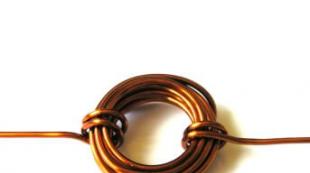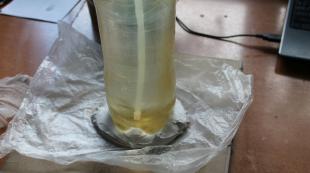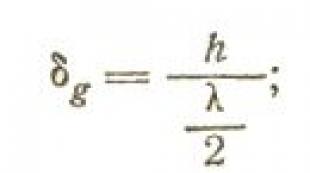How to learn to read in English without transcription. Pronunciation of English words in Russian letters - learn English easily
This article may be useful to those who learning English on his own wants learn to read in English or improve your pronunciation. As a rule, it is difficult for beginners to correctly pronounce the sounds of the English language. The main method that is offered in various tutorials and online lessons is to listen to English speech and try to pronounce the words after the speaker, imitating him. However, it is very difficult to improve pronunciation in this way, since our speech apparatus is used to Russian articulation, that is, a certain position of the lips, mouth muscles, and tongue.
Even if you have an ear for music, you will need an experienced teacher and educational literature. I would like to immediately warn the reader that you should not set yourself the task of achieving an “Oxford pronunciation”. And not because it's impossible. The fact is that in the UK people speak several dialects, and their pronunciation is different: even in London, not to mention England, it is very different. Renowned English phonetician Mr Higgins said that by pronunciation, he could determine in which part of London a person lives. An exemplary pronunciation is provided by the announcers of the official channels of British television, BBC radio, and, probably, professors at Oxford, London or Cambridge University.
“If you are studying English with the intention of traveling to England and you want to be understood there, do not try to become perfect in the language, because if you succeed, no one will understand you.<…>There is no perfect English, there is decent English, which we call "good"<…>.»
Back in school I read a funny text on this topic: "When I arrived in England, I thought I knew English". Here is a translation of a small excerpt from it:
“When I first came to England in 1938, I thought I knew English pretty well. In Europe, my knowledge of the language seemed enough.
In England I encountered two difficulties: firstly, I did not understand people, and secondly, they did not understand me. Text was easier. Every time I read an editorial in the Times, I understood everything perfectly, the only thing I could not make out was whether the Times was behind or against something. But then I attributed it to my lack of knowledge of the language.
My first step on the path to success was that, finally, people began to understand me, while I still did not understand them. At this stage, I talked the most. Soon I began to understand the English, and all thanks to my friend, who revealed to me the secret of English pronunciation, namely indistinct English mumbling".
Yes, this is how it is, English pronunciation is slurred)) But this is only at first glance. So we start our English lessons for beginners, and let's set ourselves a modest but realistic goal - learn to read English and at the same time master "good" English pronunciation. And this requires patience and persistent systematic training. But before we start our course of lessons, let's see why there is an opinion that the most difficult thing in English language is learning to read.
Why "Liverpool is spelled but Manchester is pronounced" or how to read in english word right?
Really, Words in English are read quite differently from how they are written. I've been wondering this for a long time and finally figured it out. And the wonderful book “My Favorite Sounds” helped me in this, the authors of which are O.M. Korchazhkin and R.M. Tikhonov. From it I learned that, it turns out, there are three basic principles on which the spelling system of any language is built:
- phonetic principle, when the letter fully reflects the sound composition of the word: as we speak, so we write (Latin);
- morphological principle, when the letter reflects only part of the sound composition of the word (Russian language);
- historical principle, when the spelling of a word is explained by historical traditions and does not match the pronunciation (English).
So, about 400-500 years ago, the British pronounced words in the same way as they wrote, that is, for example, the word knight in Old English was pronounced, silent letters k, gh were then read. But time passed, and the sound side of the language underwent serious changes, while the spelling of words practically did not change, it remained the same as it was in the 15th century.
This defines a huge number of rules and patterns, which need to be remembered so that the same letter is read differently depending on the type of syllable or the letters that surround it. But everything can be understood if you understand the basic laws of the English language. It's clear why Do English words read differently than they are written?
Then let's figure out how to learn to read English words correctly
Sometimes when learning English, beginners use study guides in which English words are written in Russian letters. But such an approach also implies an appropriate pronunciation. What a horror to hear English voiced in Russian! And what do the authors of such textbooks think? After all, someone who does NOT learn to pronounce English sounds correctly from the very beginning runs the risk of not learning to understand the interlocutor at all.
With a spelling system based on morphological as well as historical principles, the same letter can convey different sounds. Take, for example, the Russian language. So the letter "g" in the word "goal" is pronounced as "g", in the word "boot" - "k", "his" - "in", "easy" - "x". But such changes are insignificant and there are not so many of them.
However, in English, things are much more complicated. First, it has only 6 vowels. A, O, E, I, U, Y, but each is read in 4 ways, depending on the type of syllable. Secondly, vowels form combinations with other vowels, the so-called diphthongs (there are only 8 of them) and there are still 2 triphthongs.
Yes, learning to read in English is not easy. But what if you study English on your own, without a teacher. How to learn to read English words? Here comes to the rescue transcription. Don't be afraid of this word!
Transcription is a system for recording the sound image of a word using transcription marks, which are letters of the Latin and Greek alphabets. And the French scientist Paul Passy came up with the transcription in 1889.

Phonetic transcription signs
Transcription words are written in square brackets. To indicate the length of the sound, a colon is placed after it. With transcription, you can record exactly how each word is read, no matter how it is spelled. Transcription is a kind of international code with which you can record the sound image of a word in any language.
English pronunciation and sounds of English
Sounds of English you must immediately learn to pronounce correctly, because most English sounds are very different from similar Russian sounds.
Omitting all the theory that phonetics textbooks abound in, in this course I will touch on the main differences between Russian and English sounds and talk about common pronunciation mistakes invoking theoretical concepts only as needed.
But let's start with the most important thing, namely, what distinguishes English pronunciation from Russian. This tongue position(1) and articulation power (2).
- Language position. This is especially noticeable when we are silent. Here, check yourself. Are you silent now? What position is your tongue in? I’ll try to guess, if you are Russian, then your tongue lies in a slide, strongly adjoins the teeth with the front part (it seems to be cramped in the mouth), the tip is bent down and is located at the lower teeth. This position is called dorsal. What about the Englishman? In this case, his tongue will be pulled back, lying flat and bent upwards, and its tip will be located at the very alveoli or not even reach them. Alveoli are tubercles above the upper teeth.
- The power of articulation. Energetic Englishmen pronounce words, exhaling air with force and straining the muscles of the mouth. And the Russians do not tense up, moving their lips weakly, they pronounce sounds easily, deafen the consonants at the end, in general, they are lazy.
What's the matter here? Some say this because of the Russian character, others because of the anatomical features of the structure of the speech apparatus. Who knows…
So, practice, even when silent, keep your tongue concave in your mouth, pressing the tip to the alveoli, and now you have already taken the first step towards becoming a real Englishman.
For those who want to improve their pronunciation, English lessons with native speakers in the rubric
Learn English on your own friends! See you in the next lesson on learning to read! Tatyana Nabeeva, course author
In the first field, type the word you want to translate, in the second field, select the direction of translation (the default is English-Russian translation), to translate, press the "enter" key or the magnifying glass icon. Translation with transcription will appear below.
English words with transcription and pronunciation
- Type Russian characters on your keyboard - turns on the on-screen keyboard for Russian characters;
- Show keyboard - opens the on-screen keyboard for Russian letters;
- Hide keyboard (to type in English) - hides the on-screen keyboard for Russian letters.
This is an electronic version of the Oxford Pocket Dictionary of English-Russian and Russian-English. An authoritative professional dictionary that contains about 210,000 words and phrases.
If you dream of learning English abroad, then this link is for you. Description of schools with photos and videos, duration and intensity of courses, as well as how much it all costs.
Applications to the online dictionary. Brief information on English grammar
1 The article in which . Gives an idea of how many letters are in the English alphabet and how it is read.
2 These articles deal with the phonetic transcription of English. In the first part are given. In the second part - .
3 English verbs: right and wrong. What is the difference, as well as three forms of irregular verbs or.
4 In the article you can learn how to pronounce English numbers correctly, how to translate numbers from Russian into English, how dates are pronounced in English, as well as mathematical formulas and expressions.
5 have differences. It is also useful to know about this, so as not to be surprised why the same words in different texts are spelled differently.
About this English-Russian and Russian-English online dictionary with transcription
I have long wanted to put on my site a goodonline translator with transcriptionand various meanings of words, and this one, in my opinion, is one of the most successful. Most sites use a text translation system using translator programs such as Socrates. But for learning English, this is not the most suitable online dictionary, because when we meet an unfamiliar English word, we need to find out its transcription, stress, and ambiguity of use cases. When translating, it is important dictionary. With purely machine translation, at best, we will lose the very meaning of the statement and its stylistic component, and at worst, we will get an unrelated set of words. Computer servicesonline translatorsdo not provide a view various meanings words or their choice is limited, so machine translation must be corrected using such dictionaries. On the site "site" you are given the opportunity to take advantage of high-qualityonline dictionary completely free, that is, it is an English Russian dictionary with pronunciation. It doesn't matter what you wanted to find in the search engine: be itRussian translator online, or English online translator or free online translator- the dictionary presented here is exactly what you need. The dictionary will help you find answers to many questions that arise when translating. If you have the Internet, then you are sure to find the right word. And since you are reading this text, then you definitely have it. By the way, in addition to the English-Russian and Russian-English directions, there are many other languages \u200b\u200bin the base of this dictionary, so thisfree online translator with- one of the best options that can be found on the Internet among English Russian translators with transcription and pronunciation! So if you don't have a paper dictionary handy, you can always rely on an electronic one.online english dictionaryon that website. Use and achieve success in learning English.
Transcription is a recording of the sound of a letter or word as a sequence of special phonetic characters.
Transcription may not be interesting to everyone, but, no doubt, useful. Knowing the transcription, you will correctly read an unfamiliar word without outside help. In the classroom, you yourself can read the transcription of a word (for example, from the blackboard) without asking others around, thereby facilitating the process of mastering lexical material, etc.
At first there will be errors in the correct reading, tk. there are always some subtleties in pronunciation. But this is just a matter of practice. A little later, if necessary, you can transcribe the words yourself.
Transcription is directly related to reading rules. In English, not everything that is seen (letter combinations) is read (as in Russian and Spanish, for example).
When textbooks (mostly domestic) talk about reading rules, much attention is paid to the type of syllable. About five such types are usually described. But such a detailed theoretical presentation of the rules of reading does not make the lot of a beginner much easier, and can even mislead him. It must be remembered that a good knowledge of the rules of reading is a great merit of practice, not theory.
Your attention will be presented with the basic rules of reading individual letters and letter combinations. "Behind the scenes" there will be some phonetic moments that are difficult to convey in writing.
A little patience! Both transcription and reading rules are easily acquired in a short time. Then you will be surprised: "How easy it became to read and write!"
However, do not forget that, despite its widest distribution, English does not cease to be a LANGUAGE full of exceptions, stylistic and other delights. And at any stage of language learning, and especially at the beginning, look into the dictionary more often.
Transcription icons and their pronunciation
| Symbols. Consonants |
Sound pronunciation (similar Russian) |
Symbols. Vowel sounds |
Sound pronunciation (similar Russian) |
| [b] | [b] | single sounds | |
| [d] | [d] | [ Λ ] | [ a ] - short |
| [f] | [f] | [a:] | [ a ] - deep |
| [ 3 ] | [zh] | [i] | [ and ] - short |
| [d3] | [j] | [i:] | [ and ] - long |
| [g] | [ G ] | [o] | [o] - short |
| [h] | [ X ] | [o:] | [o] - deep |
| [k] | [ to ] | [u] | [y] - short |
| [l] | [l] | [u:] | [y] - long |
| [m] | [m] | [e] | as in the word "plaid" |
| [n] | [n] | [ ε: ] | as in "honey" |
| [p] | [ P ] | diphthongs | |
| [s] | [ from ] | [əu] | [ OU ] |
| [t] | [ T ] | [au] | [ay] |
| [v] | [ in ] | [ei] | [ Hey ] |
| [z] | [h] | [oi] | [ Oh ] |
| [t∫] | [h] | [ai] | [ai] |
| [∫] | [w] | ||
| [r] | Soft [r] as in the word Russian | ||
| [ about | The sign of softness as in the Russian letter Ё (Christmas tree) | ||
| Sounds without analogies in Russian | |||
| [ θ ] | [ æ ] | ||
| [ ð ] | |||
| [ ŋ ] | Nasal, in the French manner, sound [ n ] | [ ə ] | [neutral sound] |
| [w] | |||
Notes:
In many school textbooks and in some domestic dictionaries, this sound is designated as [o]. But, in modern English words aryakh this sound is usually denoted as shown in the table.
Diphthong is a complex sound, which consists of two sounds. In most cases, the diphthong can be "broken" into two sounds, but not in writing. Since in many cases one of the constituent sounds of a diphthong, if used separately, will have a different designation. For example, the diphthong [ au ]: separately such a transcription icon as [ a ] - does NOT exist. Therefore, most diphthongs are indicated not by a combination of different transcription signs, but by their own sign.
In many school textbooks and in some domestic dictionaries, this sound is designated as [ou], which is more descriptive. But, in modern English dictionaries, this sound is usually denoted as shown in the table.
This sign often denotes unstressed vowel sounds in transcription, regardless of the letters (combinations) that give this sound.
Reading Rules
English words have several types of syllables. However, to understand the whole system, it is necessary to remember and distinguish between the following two types: open and closed.
open syllable ends in a vowel: game, like,stone- the vowel in the word is read in the same way as in the alphabet.
Closed syllable ends in a consonant: pen, cat, bus- a vowel in a syllable gives a different sound.
Stress in transcription and words is indicated by a vertical bar before stressed syllable.
single vowel sounds
| Sound | rules |
| [e] | usually given by the letter e in a closed syllable: get [ get ], vet [ vet ] as well as the letter combination ea: dead [ded], pleasure [´ple3ə] Note: the same letter combination often gives the sound [ i: ] (see below) |
| [i] | usually given by the letter i in a closed syllable: hit [ hit ], kill [ kil ] as well as the letter y in a closed syllable: gym [d3im], cylinder [´silində] Note: the same letters in an open syllable give the sound [ ai ] (see below) |
| [i:] | occurs in the following letter combinations: e + e (always): meet [ mi:t ], deep ; letter e in open syllable: tree [ tri: ], Steve [ sti: v ]; in the letter combination e + a: meat [ mi: t ], beam [ bi: m ] Note: the same letter combination (ea) often gives the sound [ e ] (see above) |
| [o] | usually gives the letter o in a closed syllable: pot [pot], lottery [´lotəri], as well as the letter a in a closed syllable after w: wasp [wosp], swan [swan] |
| [o:] |
|
| [ æ ] | usually given by the letter a in a closed syllable: flag [ flæg ], married [ ´mærid ] |
| [ Λ ] | usually given by the letter u in a closed syllable: dust [dΛst], Sunday [´sΛndei]. As well as: double: double [dΛbl], trouble [trΛbl] ove: glove [glΛv], dove [dΛv] Note: but there are also exceptions: move [ mu:v ] - (see below); flood [flΛd], blood [blΛd] - (see above) |
| [a:] | occurs in the following combinations:
3. Rare: salmon [sæmən] |
| [u] [u:] |
the length of this sound in most cases varies for historical reasons, rather than orthographic ones. That is, for each word it is determined individually. This difference in longitude does not carry a huge semantic difference, as in other sounds. And in oral speech, it does not need to be specially emphasized. This sound occurs in the following cases:
|
| [ ε: ] | occurs in closed syllables with the following letter combinations:
|
| [ ə ] | Most unstressed vowel combinations give a neutral sound: famous [ feiməs ], computer [ kəmpju: tə ] |
Vowel diphthongs
| Sound | rules |
| [ei] |
|
| [ai] | usually occurs in the following cases:
|
| [oi] | usually occurs in the following cases:
|
| [au] | occurs in the following combinations:
|
| [əu] |
2. the same letter combination often gives the sound [ au ] (see above) |
| [iə] |
|
| [eə] | give the following spellings:
|
| [aiə] | give the following spellings:
|
Consonants
| Sound | rules |
| [∫] | there are several letter combinations that always give this sound (among others):
|
| [t∫] | always occurs in:
|
| [ ð ] [ θ ] |
These two sounds are given by the same letter combination th. Usually, if this combination of letters is in the middle of a word (between two vowels), then the sound [ð] appears: without [wi´ðaut] And, if it is at the beginning or end of a word, then there is a sound [ θ ]: thanks [ θænks ], faith [ feiθ ] |
| [ ŋ ] | nasal sound occurs in the letter combination vowel + ng: sing [siŋ], hungry [´hΛŋgri], wrong [wroŋ], hang [hæŋ] |
| [j] | softness in sound may occur in some cases, and not manifest itself in any other similar cases, for example super [ ´s u: p ə] (see dictionary):
|
Dear Guest! You have decided to start learning English and, of course, the first thing you want to know is how to learn to read English from scratch. It is believed that the most difficult thing in English is learning to read correctly. And it is true! The English language has a historical principle of word formation, so many words in it are not read the way they are written. Heard the phrase Why is it written Liverpool, but pronounced Manchester??
And this article is for those who want to know in in general terms, how to learn to read english from scratch on your own.
How to learn to read English from scratch?
1. Where to start? — English alphabet!
let's start from the English alphabet. First, just listen to it:
ABC Song (classic UK version)
* * *
So, you have heard all 26 English letters. Here english alphabet in tables. To enlarge, click on the picture.

TABLE 1: English alphabet (in block letters)

TABLE 2: English alphabet (capital letters)
The alphabet is given for reference only, it is not necessary to learn it yet. Remember that everything There are 26 letters in English, of which 20 are consonants and 6 are vowels. So let's get started!
2. How to learn to read English from scratch? Reading English consonants and their letter combinations
Beginners to learn English from scratch should understand that sounds in English are fundamentally different from sounds in Russian, so it is especially difficult to “start”. After all, first we need to accustom our mouth (articulatory apparatus) to the English pronunciation, as phoneticians say, “set the pronunciation”. It's not easy, but worth it.
And for the rest, I’ll tell you that out of 20 English consonants, there are those whose pronunciation almost coincides with similar consonant sounds in Russian (group I).
Group I. English consonants similar to Russian:
Letters l, m, n.- Sounds
english letter l l- sound [l] - read as "l" (only solid, as in the word varnish and at the same time strongly press the tongue to the palate).
english letter m m- sound [m] - read as "m" (only squeeze your lips more strongly than when pronouncing the Russian "m").
english letter n- sound [n] - read as "n" (only press the tongue not to the teeth, as in Russian, but to the tubercles above the teeth higher than the teeth and stronger!)
Imagine! Of the 20 English consonants, there are only 3 sounds, the pronunciation of which does not need to be bothered. But the remaining 17 ... can cause a Russian accent! However, you can learn to read them correctly by YOURSELF!
Group II. English consonants, incorrect pronunciation is the cause of the Russian accent:
In English, there are no letters that convey some sounds, for example, Russian "sh", "ch", as well as the interdental sound "s". These sounds are expressed using letter combinations. There are 4 such letter combinations in total.
Reading English letter combinations:
1. Letter combination sh -
letter combination sh reads like a "sh" sound. In transcription, this sound is denoted by [∫].
letter combination ch reads like hard sound"h". In transcription, this sound is denoted.
letter combination ck reads like a "k" sound. In transcription, this sound is denoted by [k].
4. Letter combination th -
letter combination th read [Ɵ] or [ð]. There is NO such sound in the Russian language. learn pronounce TH correctly.
4. Letter combination qu -
letter combination qu is read. These are two sounds [k] and [w]. There is NO sound [w] in Russian. To pronounce it, you need to fold your lips into a tube, as for the sound "u", and then quickly move your lips apart. Find sound [w] in the ENGLISH SOUND CHART and listen to it.
TOTAL you studied 4 English letter combinations: sh, ch, th, qu.

Table 3 "English consonants" (in brackets it is indicated how they are read)
The arrows indicate that the letters ss, gg, Ss, Xx are read in two ways, depending on which letter they are in front of. Such a phenomenon is called
3. Reading English consonants and their letter combinations
Vowels in English are read in a special way. As you, I hope, remember, in English there are 6 vowels: Aa, Ee, Ii, Oo, Uu, Yy, and they transmit 20 vowels when reading, since each is read in 4 ways. Of course, I can’t explain all this in one article! You can learn more about reading English vowels from the lesson on learning to read in English No. 21
So, in this article I tried to explain, how to learn to read in english from scratch, introduced you to the English alphabet and how to read English consonants, letter combinations and vowels. What is not clear, write in the comments! Good luck!
In conclusion, the task for those who are learning to read English from scratch:
1) listen to the song "English alphabet" - 5 times
3) watch a video from the wonderful film "My Fair Lady", which is dedicated to teaching correct English pronunciation))) You will see how Eliza Doolittle studies pronounce the sound [h] correctly.
She repeats the phrase " ln Hertford, Hereford and Hampshire hurricanes hardly ever happen”(translation of this phrase: Hartford, Hereford and Hampshire rarely experience hurricanes). Saying this phrase in English, she does not pronounce the sound [h] at all (this is a strong exhalation). She sounds like this: ln Ertford, Ereford and Ampshire Urricanes Ardly ever Appen", and Mr. Higgins teaches her how to pronounce the sound [h] - correctly.
The rules for reading in English are extensive and complex, as there is a huge discrepancy between letters and sounds: there are 26 letters, and 44 sounds, therefore different letters in different positions produce different sounds that are transmitted in English symbols called transcription marks. In this post, to facilitate the assimilation of the rules of reading, we designate them partially in Russian letters.
4 main types of vowel reading
To begin with, let's learn 4 main types of reading vowels E, A, Y, U, O, I in stressed syllables in English
Google shortcode

I reading type - open syllable ( A syllable ending in a vowel is considered open, even if it is not pronounced)
Pay attention to the first line of the table. The words same, note, he, fine, my, cube, like all words of this category, end in a silent vowel, and the reading of vowels in the root of the word coincides with the name of the letters according to the alphabet. Thus, words with dumb vowels at the end, i.e. words of type 1 reading same, note, he, fine, my, cube, will sound like “seim, laptop, hee, fine, may, cube”
Let's fix the reading of vowels in the stressed syllable with the following exercise:
Note, lone, mice, rice, type, tune, shy, lay, say, he, hay, name, same, nine, nice, game, came, make, Kate, Pete, five, tie, life, eve, me, size, no, cope, smoke, rose, nose, spine, sly, cry, vine, maze, home, tube, made, fume, cube, pace, lace, sky, hale, spine.
II reading type - closed syllable (a syllable ending in a consonant is considered closed). This is the second row in the table. Pay attention to the words rat, hot, red, bit, myth, run, at the end of which there is no mute vowel. These words sound like "rat, hot, red, beat, miss, run."
Cap, pen, bed, ten, not, spot, lot, bad, rat, sit, send, test, pit, in, send, spell, tin, less, ban, mad, fat, Sam, land, did, fit, sat, pet, tin, slip, sad, glad, bag, jam, gap, lag, can, kin, Jim, Jack, yes, ink, cup, run, cod, spin, not, doll, hop, hot, bank, rank, spin, up, us, bus, bun, cut, fun, vet, well, but, nut.
III type of reading - vowel + letter “r” , which affects the sound of the vowel at the root of the word, giving it some length. So the words car, sort, term, fir, Byrd, fur sound like “ka: so: t, those: m, fe: be: d, fe:”.
stern , Far, curt, hard, hart, car, card, cart, fork, cork, work, sort, term, first, Byrd, furs, curl, her, curb, turn, girl, sir, burn, turn, word, born, torn, bird, form, serf, herb.
IVreading type - vowel + letter “r” + vowel. The letter "r" in this case is also not readable; all three vowels together sound like this: care, store, mere, tire, cure - “kea, one hundred:, mie, taie, kyue”.
Fare, here, pure, rare, cure, during, mare, fire, bare, mire, stare, tire, sere, mere, store, core, more, care.









